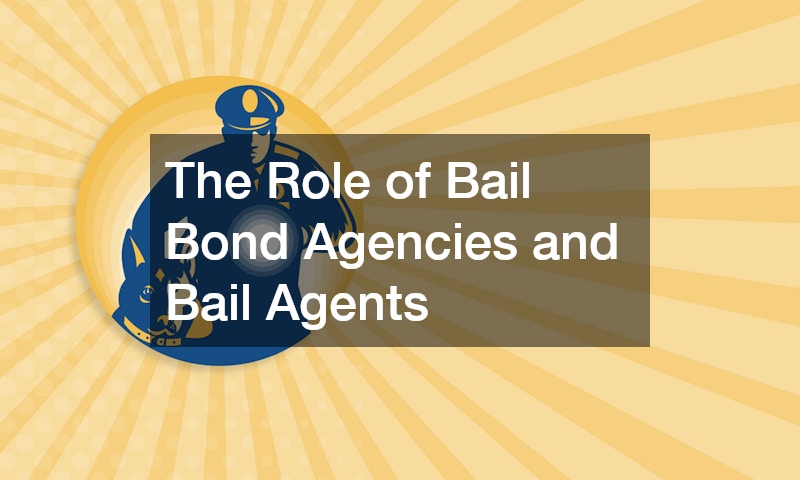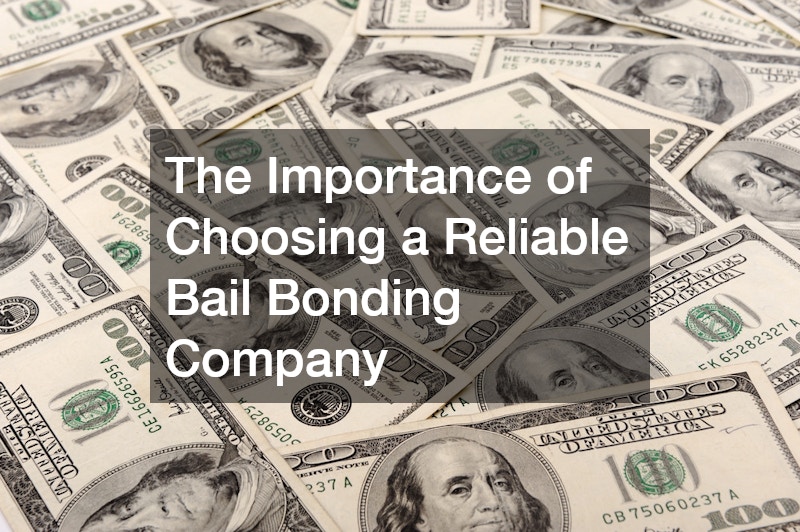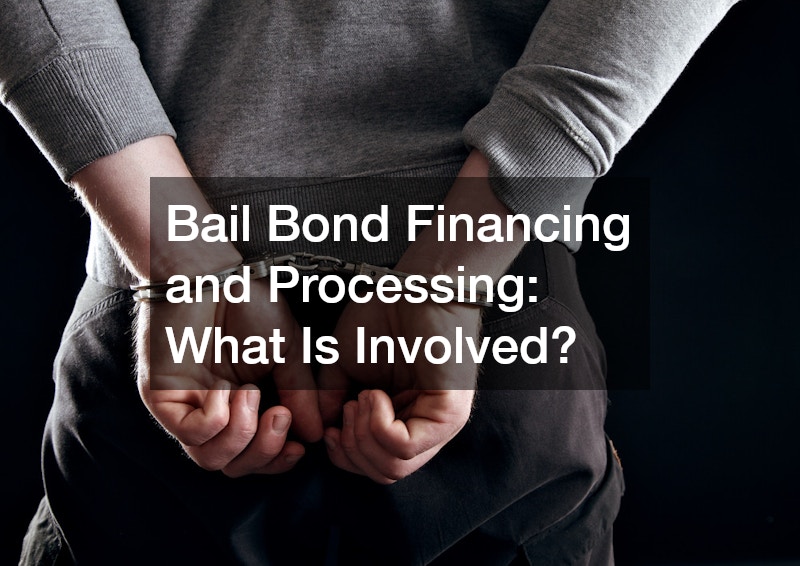When someone is arrested and charged with a crime, they may be eligible for bail to secure their release while awaiting trial. Bail provides a way for an accused individual to be released from jail temporarily, while they work on their defense with their attorneys or lawyer. However, many people are unable to pay the full bail amount upfront, especially when the bail set is high. In such cases, bail bond financing comes into play. Bail bond financing allows individuals to access the funds they need to secure their release, providing them with the opportunity to continue their lives as they await their court appearance.
In this article, we will explore bail bond financing and the entire process involved, including what happens when small bonds are involved, how felony charges affect bail amounts, and the role of bail agents, bail bonds services, and bail bonding companies in securing release. We’ll also discuss the different types of local bail bond agencies available, how bail bond services work, and how long it takes to process a bond. The goal is to provide you with a clear understanding of how the system operates and what to expect if you find yourself in need of bail bond services.
What Is Bail Bond Financing?
Bail bond financing refers to the financial assistance provided to individuals who cannot afford to pay the full bail amount on their own. A bail bond agency typically provides the money needed to secure a person’s release from jail. In exchange, the defendant or their family agrees to pay a non-refundable fee, usually 10% of the total bail amount, which the bail bonding company keeps. This fee is the primary source of income for the bail bonds agency.
Bail bond financing is an essential part of the criminal justice system, ensuring that those facing charges have the opportunity to fight their case from outside jail. Without this service, many people may not have the financial means to post bail, even for small bonds. Bail bond agencies help those in need by offering a flexible and accessible way to navigate the legal process. Whether the bail amount is set for small bonds or for larger sums due to felony charges, bail bond financing makes it possible for people to obtain their release while still fulfilling their legal obligations.

The Role of Bail Bond Agencies and Bail Agents
Bail bond agencies are companies that offer bail bond financing to individuals who need assistance with securing their release from jail. These agencies are responsible for providing the necessary funds to the court to ensure that the defendant can be released while awaiting trial. In exchange, the individual or their loved ones must pay a premium to the agency, which is typically 10% of the bail amount. Bail bond agencies typically work closely with bail agents, who act as intermediaries between the client and the court.
Bail agents are professionals employed by bail bonding companies. They help facilitate the bail bond process and ensure that everything runs smoothly. Bail agents also act as guarantors for the bond, agreeing to take responsibility for the full bail amount if the defendant fails to appear in court. This is why bail agents play a crucial role in ensuring that defendants meet their obligations and attend their hearings. Whether the bond is for small bonds or a larger amount due to felony charges, the bail agent’s responsibility remains the same—to ensure the defendant’s release and comply with the terms set by the court.
Types of Bail Bonds and How They Affect Financing
When it comes to bail bonds, not all bonds are the same. Different types of bonds are issued depending on the crime, the severity of the charges, and the individual’s circumstances. The most common types of bail bonds include cash bonds, surety bonds, and property bonds. Each type of bond comes with its own set of processes and requirements for financing, and understanding these can help ensure the appropriate action is taken to secure release from custody.
- Cash Bonds: A cash bond is when the full bail amount is paid directly to the court in cash. This type of bond is straightforward and can be the quickest way to get released. However, cash bonds may be impractical for those facing significant charges or larger bail amounts. Bail bond agencies do not typically deal with cash bonds unless the defendant is unable to afford the full amount but may still seek other financing options.
- Surety Bonds: A surety bond is a type of bond where a bail bond agency provides the funds for the full bail amount, and the individual or their family pays a non-refundable premium, typically 10%. This is the most common form of bail bond and is often used for individuals facing felony charges. The bail bond company assumes the risk of the bond and guarantees the defendant’s appearance in court.
- Property Bonds: Property bonds involve using real property, such as a home, as collateral to secure a bail bond. This option is often used when the defendant’s bail is particularly high. A property bond allows individuals who may not have enough liquid cash to still secure bail through the equity in their property. Like surety bonds, property bonds also require the defendant to attend all court hearings to avoid forfeiting the property.
Understanding the different types of bonds and their impact on bail bond financing is crucial. A bail bonding company can help assess which type of bond is most appropriate for your situation and offer financing options if necessary, whether dealing with small bonds or larger sums associated with more severe charges.

How Bail Bonds Work
When an individual is arrested, the court will set a bail amount based on various factors, including the severity of the charges, the defendant’s criminal history, and whether the individual is a flight risk. For small bonds, the amount may be relatively low, and an individual may be able to pay it directly. However, for more serious offenses such as felony charges, the bail amount can be substantial.
If the defendant cannot afford to pay the full bail amount, they can turn to a bail bond agency for help. The agency will provide the necessary funds in exchange for a premium, which is typically 10% of the total bail. Once the bail is posted, the defendant will be released from jail, but they must agree to appear in court for all required hearings. Failure to do so can result in the bond being forfeited and the defendant being re-arrested.
In some cases, bail bond agencies may require collateral to ensure that the bond is secure. This collateral could include assets such as property, vehicles, or other valuables that the agency can seize if the defendant fails to meet the terms of the bond. The role of the bail bonding company is to ensure the bond is processed properly and to help the defendant comply with court requirements.
The Process of Securing Bail: Step-by-Step
The process of securing bail involves several steps. The first step is when an individual is arrested and taken into custody. After the arrest, the court will set a bail amount based on the severity of the charges. The defendant or their family may not have enough money to pay the full bail amount, which is where bail bond financing comes in.
- Contact a Bail Bond Agency: The defendant or their loved ones will need to contact a local bail bond agency to begin the process. Local bail bond agencies are available 24 hours a day, so the process can begin immediately after the arrest.
- Provide Information to the Bail Agent: The bail bond agency will gather necessary information, including the defendant’s charges, personal information, and any relevant history, to assess the risk involved. This helps the bail agent determine whether they are willing to take on the bond and what conditions they may impose.
- Agreement and Premium Payment: Once the bail bonding company agrees to post the bond, the defendant or their family must pay the premium. This is typically 10% of the bail amount. The premium is non-refundable, regardless of the outcome of the case.
- Posting the Bail: After the premium is paid, the bail bond agency posts the bond with the court, and the defendant is released from custody. The defendant is then required to comply with the terms of the bond, which typically include attending all court hearings and complying with any other conditions set by the court.
- Conclusion of the Case: Once the case has been resolved, the bail bond is exonerated, and the bail bond agency is no longer responsible for the bond. If the defendant has fulfilled their obligations and attended all required hearings, the bond is released, and no further action is required.
What Happens if the Defendant Fails to Appear in Court?
The defendant’s responsibility does not end with their release. They are required to appear in court for all scheduled hearings. If the defendant fails to attend their court hearings, the bail bond agency is at risk of losing the full amount of the bond. In such cases, the bail bond company will take action to ensure that the defendant is brought back into custody. This can include hiring a bounty hunter to track down the defendant and bring them back to jail.
If the defendant does not appear in court, the bond is forfeited, meaning the bail bonding company loses the premium paid. In such cases, the defendant and anyone who signed the bond may be held liable for the full bail amount. This is why it is crucial for the defendant to maintain communication with their attorneys and ensure that they comply with all court orders.
Why Work with Bail Bond Agencies and Bail Agents?
When facing criminal charges, it is essential to work with experienced bail agents and bail bonding companies. These professionals understand the intricacies of the legal system and the bail bond process. They can help guide you through the process and ensure that everything is handled correctly, from securing small bonds to more significant amounts related to felony charges.
Bail bond agencies can also provide additional services, such as offering 24 hour bail services to accommodate individuals arrested at any time of day or night. They are there to offer support and help ensure that defendants can return to their lives and families while awaiting trial.
Working with a bail bond agent also helps to reduce the stress of dealing with the financial and legal complexities of the bail system. Bail bond agents handle the paperwork, deal with the court, and provide advice, allowing defendants and their families to focus on working with their attorneys to prepare for their defense.

The Importance of Choosing a Reliable Bail Bonding Company
Choosing the right bail bonding company is critical to ensuring that the process runs smoothly and that you receive the best possible service. It is important to work with a company that is reputable and experienced in handling both small bonds and those associated with more serious felony charges. Look for a company with positive reviews, competitive rates, and a strong history of assisting individuals in similar situations.
When selecting a bail bonding company, consider factors such as the company’s availability, whether they offer 24 hours bail services, and the level of customer support they provide. Additionally, a good bail bonding company will have a transparent pricing structure and will clearly explain the process involved, so there are no surprises.
Conclusion
Bail bond financing is an essential service that ensures individuals arrested for criminal charges have the opportunity to continue their lives while awaiting trial. Bail bond agencies, bail agents, and bail bonding companies play a vital role in making this process possible, whether dealing with small bonds or more complex cases involving felony charges. Through bail bond financing, defendants can secure their release by paying a non-refundable premium, and in return, the bail agency takes responsibility for the full bail amount.
Understanding the bail bond process is important for anyone who may need to rely on this service. By working with local bail bond agencies and experienced bail agents, individuals can navigate the system with confidence, knowing that they have the support of professionals in the industry. Whether you need help securing a bail bond or just need more information on the process, these professionals are available to assist 24 hours a day.


